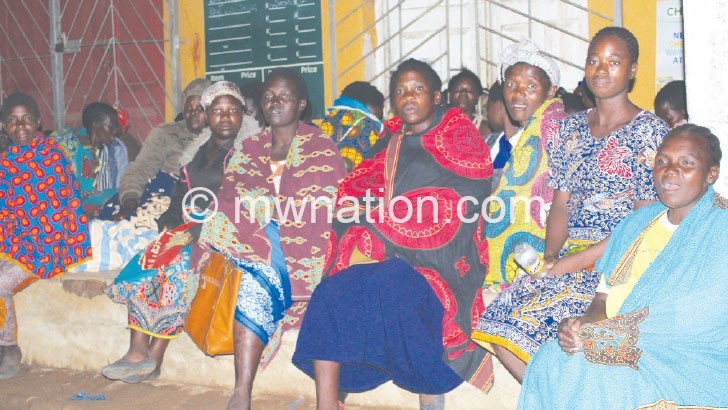Dobadobas invade AIP
They are a common sight at the Directorate of Road Traffic and Safety Services helping motorists cut corners in exchange for kickbacks they share with officials to process documents such as licences, certificates of vehicle ownership and fitness.
Malawians have also become used to seeing these ‘agents’ colloquially known as dobadobas at the Department of Immigration, collecting bribes from applicants for rapid processing of passports and other documents.
There is now a new and more expansive niche for dobadobas—the K160 billion Affordable Inputs Programme (AIP)—where the ‘brokers’ collect bribes from beneficiaries of the subsidised inputs in exchange for quick service.
We tested the AIP buying system in nine districts and discovered that for a bag of fertiliser, beneficiaries are forced to part ways with as much as K6 000—through the dobadobas—on top of the K4 495 that should be the redemption price.

Our findings correlate with information from the Malawi Police Service (MPS) and the Farmers Union of Malawi (FUM), both of whom have also been monitoring suspected extortions in AIP.
Between November 30 2020 and January 20 2021, we toured some districts; Mzimba, Kasungu, Lilongwe, Salima, Dedza, Ntcheu, Blantyre, Mangochi and Thyolo to observe implementation of the programme, specifically focusing on fertiliser.
We uncovered a syndicate involving shop attendants who are working with dobadobas to solicit bribes from farmers desperate to quickly access the cheap fertiliser.
We targeted these districts based on tips, while in some instances it was a question of checking the harrowing tales we heard of farmers suffering at the hands of AIP, including walking long distances, queuing for days and sleeping on floors while waiting to be served.
The shop attendants have taken advantage of the long queues and network glitches to ask for extra money from the poor farmers.
We tried it, and we were served faster than anyone in the districts we sampled.
Instead of just paying the approved K4 495 per bag of fertiliser, we parted with extra cash ranging from K2 000 to K6 000 per bag.
We worked with farmers who had waited for several days to buy the input and gave them the extra funds with which to palm oil the shop workers to be sold the taxpayer subsidised inputs.
For example, in six spots in Lilongwe, Salima and Ntcheu, we collaborated with some farmers on the queue to pose as their relatives, and on another spot we posed as actual farmers just to prove if indeed the bribery allegations were true.
On December 2 2020, we went to a suppliers’ depot in Salima where we joined a large crowd of farmers, some of whom had spent three days waiting for inputs. The line was long and the sun was scorching.
Apparently, everyone was eager to have the inputs and go home. Our informants located two youthful men (dobadobas) who had direct connection with the shop attendants inside.
Network was ‘allegedly’ down and the two dobadobas were collecting national IDs for scanning once network was on. We adopted two farmers as relatives and we submitted their IDs to the agents, and a negotiation for quicker service was worked out.
One of the men told us to add K2 000 per bag to be handed over to ‘bosses’ inside, saying we would be first to be assisted. We paid an extra K8 000 for four bags.
After an hour, the so-called network was back, the IDs were scanned and our farmers got the fertiliser.
We observed a similar pattern at Ntcheu Boma on December 21 and Area 24 in Lilongwe on January 20 this year where one ‘dobadoba’ helped us to buy two bags of subsidised fertiliser upon payment of extra K8 000.
Apart from observing it first hand, interviews with a cross-section of farmers in places we visited demonstrated that bribery was rife when buying AIP goods.
When we shared our findings with the police and FUM—who are also monitoring implementation of the programme nationwide—they too said had similar findings.
The police said so far at least 40 people have been arrested on corruption and theft related charges in connection with AIP.
Community Policing deputy in charge Alex Simenti said some unscrupulous traders have taken advantage of beneficiaries’ desperation and lack of information to charge more than the set price.
Simenti said, the Central Region accounts for over 50 percent of the registered cases and apart from bribery; some have been arrested for possession of other people’s national identity (IDs) cards. Some are in for abuse of office.
FUM chief executive officer Jacob Nyirenda, in a written response, said they are already engaging government to suggest some recommendations to improve the programme.
According to FUM’s findings, in most selling points, beneficiaries paid a top up amount that ranged from K2 000 to K 4 000 per bag.
The farmers’ group also learnt that some farmers were selling the fertiliser to vendors at K15 000 per bag immediately after redeeming, which he said defeats the intention of the programme of ensuring food security at household level.
Meanwhile, the Anti-Corruption Bureau (ACB), which has also been monitoring the programme, says it is compiling a comprehensive report of its findings that will be shared with the public, according to the bureau’s publicist Egrita Ndala.
She said: “ACB was involved in the monitoring of the sale of affordable inputs in some of the places across the country. There were some issues which were resolved right away. There are others which were referred to police”.
AIP is a brainchild of the Tonse Alliance administration, which replaced the Democratic Progressive Party’s 15-year Farm Inputs Subsidy Programme (Fisp).
Under AIP, the number of beneficiary households has quadrupled to 4.2 million at a cost to government of K160 billion from Fisp’s 900 000 farming families, which used to cost the taxpayer around K35 billion.
The World Bank—Malawi’s largest multilateral lender—has since warned that AIP’s “huge fiscal costs make it impossible” to sustain the scheme in future” amid dwindling revenue both from domestic and foreign resources.
Farmers weep
A common feature in most selling points as of December was congestion, which forced some farmers to spend more days waiting for network.
At Ntcheu Boma we captured women, some with babies, sleeping on bare floors of shops waiting for their turn to access fertiliser and other susbisidised inputs.
Some had spent more than three nights in open spaces amidst heavy downpour. The longer the wait the higher the expenditure, explained a woman identified as Edna from Traditional Authority (T/A) Ganya in the district.
She lamented: “I have been here for three days, but there is no fertiliser. Our friends from other extension planning areas [EPAs] have already bought the inputs, but our supplier is yet to deliver. We have to spend money on food for all this time.”
T/A Jaravikuba in Mzimba, in an interview in the area on December 28, said the supplier was yet to deliver fertiliser in his area – three weeks after planting.
Senior chiefs Mtwalo and Mabilabo complained that suppliers delivered the inputs at convenient trading centres and not in typical rural areas, which forced people to walk long distances.
This, said the chiefs, contributed to congestions at selling points and created a breeding ground for corruption.
In the new AIP arrangement suppliers are attached to an EPA for purposes of easy monitoring and accountability.
While government indicated that it had done due diligence on registration of farmers, FUM’s investigation revealed that some deserving farmers did not appear on the beneficiary list because government did not have enough time to verify names.
Calls for AIP review
FUM said it will recommend to government to call for a multi-stakeholders meeting for a performance appraisal of the programme and come up with workable solutions.
In a written response, agriculture specialist Tamani Nkhono Mvula said while AIP, as a concept is good, it has faced these challenges because government rushed its implementation.
“The Tonse Government wanted to make an impression as quickly as possible while overlooking a number of important aspects that could have made the programme successful. For instance, the programme used a biometric system that had not been tested properly. The beneficiary register was outdated, leading to a lot of leakages.
“Most of the suppliers had no or little experience in handling the commodities and I am not sure if at all due diligence was done on them. Those tasked to design the programme did not want to learn the history of implementing programmes of such magnitude,” explained Mvula.
Ministry of Agriculture is yet to respond to our findings submitted in a questionnaire more than two weeks ago despite several reminders to the minister, principal secretary and the public relations officer.





